Dubb Alternatives
Considering a switch from Dubb? This guide compares 10 alternatives, analyzing features and pricing to help you find the right tool for your business.
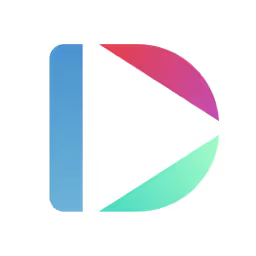
Dubb is a popular tool for good reason. Many users like its screen and webcam recorder for creating personalized, trackable videos. It's a solid choice for sales teams that want to engage clients with video messages.
However, some users report a learning curve and occasional video playback issues. We've analyzed the best Dubb alternatives based on G2 reviews to help you shortlist options for a deeper review. Let's get started.
Before We Start: A Note on 11x
If your goal extends beyond video messages to include sales automation, consider 11x. The platform provides digital workers for tasks like research and outreach. This approach may fit teams that want to augment their sales operations with automated support.
We built 11x as a GTM platform with AI agents to manage sales. Our agent, Alice, finds prospects and handles outreach, while Julian qualifies inbound leads and books meetings. The platform unifies data enrichment, outreach, and email warmup, potentially replacing several separate tools in a GTM stack.
Dubb Alternatives
Below, we examine several Dubb alternatives in detail. Each review covers pricing, core features, and a comparison of advantages and potential drawbacks relative to Dubb.
1) Loom

Loom is a video message platform to record a screen, camera, or both. Users share videos instantly and use collaboration tools. The platform has an enterprise edition for secure, large-scale administration and is used by over 400,000 companies.
Sales teams use it to personalize outreach. Engineering adds context to code reviews, customer support troubleshoots issues, and design teams share ideas for feedback.
Loom's Main Features
- Offers AI-powered tools for automatic video enhancement and converting scripts into documents or messages.
- Includes a video editor to trim and stitch clips, and add custom backgrounds, text, or overlays.
- Provides viewer engagement tools like comments and calls-to-action, plus automatic transcripts and captions in over 50 languages.
How Loom Compares to Dubb
Average Review score: 4.7/5 stars based on 2,119 G2 reviews.
- Loom includes AI features to create meeting summaries and action items from recordings, offering more post-meeting support compared to Dubb's core video messaging.
- Its video editor lets you edit the video by editing the text transcript, a different approach from Dubb that some users may find simpler.
- The platform automatically generates transcripts and captions in over 50 languages, providing broader accessibility for global teams than Dubb's standard options.
- A free starter plan includes a screenshot capture and editing tool, offering entry-level features distinct from Dubb's primary packages.
Loom's Limitations Compared to Dubb
- Dubb provides customizable video landing pages with unique branding and calls-to-action. In comparison, Loom shares videos on a standard page with fewer options for personalization.
- The platform lacks a built-in feature for sales automation sequences, a function that Dubb offers to create automated video email campaigns.
- Some users find Dubb's analytics more detailed for sales purposes. It tracks individual viewer data and integrates it into a CRM, whereas Loom provides more general engagement metrics.
Pricing and Value Compared
Loom offers a free starter plan and a Business plan at $15 per user per month. Dubb's Pro plan is more expensive at $59 per month, a price point that includes its sales automation and CRM features.
2) Vidyard
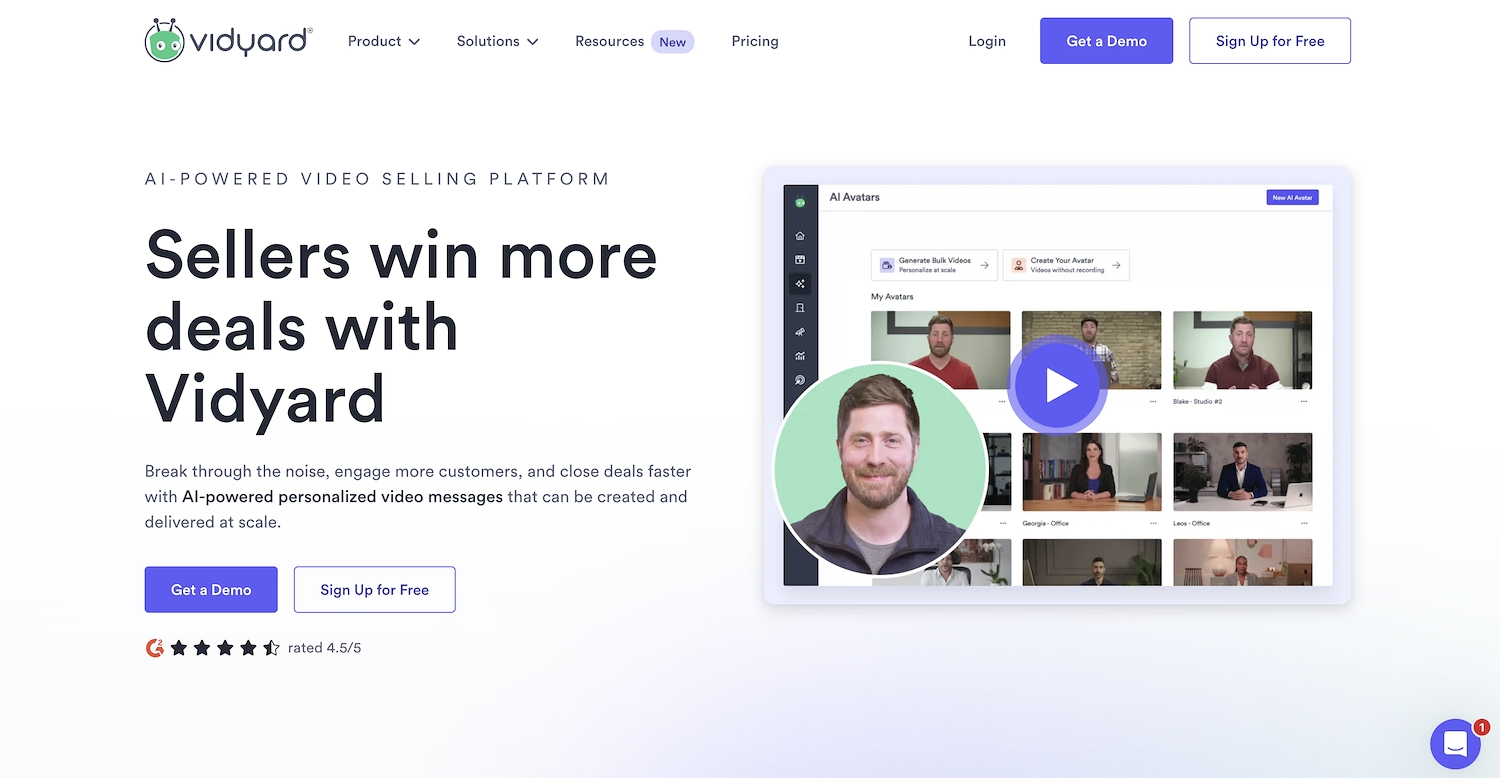
Vidyard is a video platform for revenue teams. Users create, personalize, and deliver video messages at scale. The platform helps sales teams to engage prospects and close deals faster. It also provides a way to track video performance through detailed analytics.
More than 100,000 teams use it for sales outreach, marketing, and corporate communications. Users include companies like LinkedIn, Microsoft, and HubSpot.
Vidyard's Main Features
- Provides an AI Avatar for each representative to automate sending personalized videos and replicate top-performing messages.
- Offers a central library for video assets with engagement triggers that can activate the Video Agent for automated follow-ups.
- Includes native connections with tools like Salesforce and Salesloft, allowing users to record from their GTM stack and push data to their CRM.
How Vidyard Compares to Dubb
Average Review score: 4.5/5 stars based on 808 G2 reviews.
- Vidyard provides an AI Avatar for each sales representative to automate personalized video creation, a feature not present in Dubb.
- The platform uses a Video Sales Agent to automatically send videos based on specific customer actions, offering more dynamic automation than Dubb’s pre-set email sequences.
- It allows users to record videos directly from their GTM stack, like Salesforce, whereas Dubb's integration mainly pushes analytics data into a CRM.
- The tool includes a central video library with engagement triggers for automated follow-ups, which is a different approach to Dubb's standard video management.
Vidyard's Limitations Compared to Dubb
- Dubb offers more in-depth customization for its video landing pages, including specific branding and calls-to-action. Some users may find Vidyard's options for page personalization more limited in comparison.
- The platform's automation centers on building pre-set video email sequences. This workflow differs from Vidyard's system, which automates responses based on specific customer actions and may be less direct for certain outreach campaigns.
- Dubb provides granular analytics that track individual viewer data. In contrast, some Vidyard users note that its platform could offer more detailed, per-contact information for sales tracking.
Pricing and Value Compared
Vidyard offers a free plan, while its paid Starter plan at $59 per user per month is priced identically to Dubb's Pro plan. This makes Vidyard a more accessible entry point, though value at the paid tier depends on a direct feature comparison. For a detailed breakdown, check the pricing on Vidyard's official website.
3) BombBomb
BombBomb is a video messaging tool used to record and send videos. It is popular in relationship-focused industries like real estate and automotive sales. The platform allows users to create videos from their desktop or a mobile app to connect with clients.
BombBomb's Main Features
- Offers a screen recorder and a mobile app for creating videos from any location.
- Provides email templates and real-time notifications when a video is watched.
- Integrates with Gmail, Outlook, and various CRMs to fit into existing workflows.
How BombBomb Compares to Dubb
Average Review score: 4.4/5 stars based on 739 G2 reviews.
- BombBomb's mobile app is often noted for its simple interface, which can benefit teams that frequently work away from a desk.
- The platform includes a "Prompt" feature that gives users daily video ideas. This helps teams maintain consistent outreach, a function not found in Dubb.
- Its core design centers on deep email client integration, allowing users to record and send videos directly from their inbox.
BombBomb's Limitations Compared to Dubb
- Dubb provides more options for customizing video landing pages with specific branding. Some users may find BombBomb's landing pages to be more basic.
- The platform's video editing tools are less advanced than Dubb's. This could be a factor for users who need to make detailed edits.
- BombBomb relies on integrations for complex automation. Dubb offers built-in sales automation sequences for creating multi-step video campaigns.
Pricing and Value Compared
BombBomb offers an Essentials plan at $33 per user per month. Its Plus plan is $49 per user per month, which is less than Dubb's Pro plan. This makes it a competitive option for teams focused on core video messaging features.
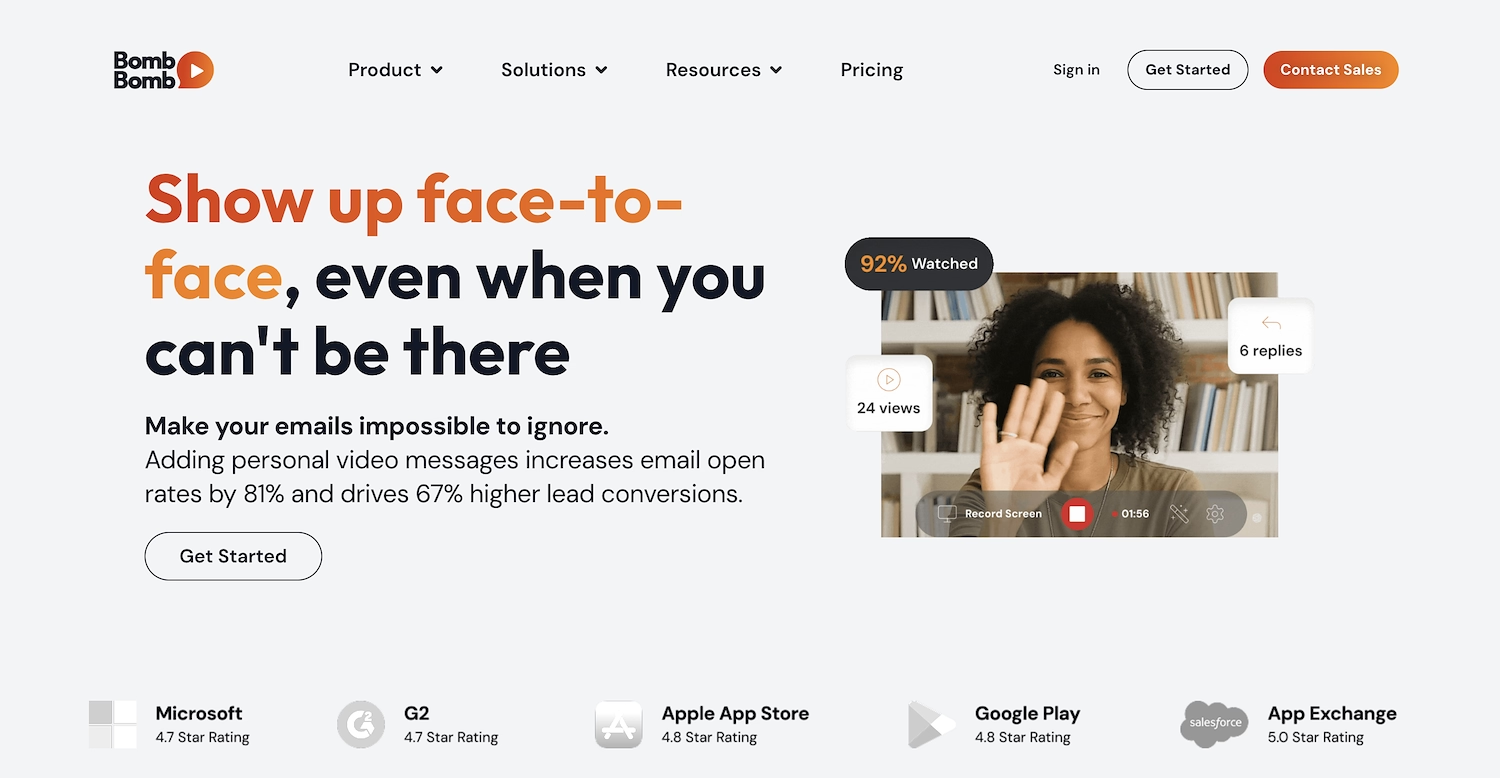
BombBomb is a video-messaging platform to record, embed, send, and track personal videos, primarily inside email. It creates "face-to-face" communication at scale. The tool serves sales, marketing, and support teams in industries like real estate and software.
Use cases include a boost to response rates, shorter sales cycles, and a reduction in customer support touches. The company reports 45,000 customers use the platform for personal video outreach.
BombBomb's Main Features
- Automates outreach campaigns with smart assignment and fallback logic using its Copilot feature.
- Organizes videos with labels and team workspaces, including role, team, or user-level access controls.
- Ensures enterprise-grade security with SOC 2 Type II compliance, single sign-on (SSO), and role-based access control (RBAC).
How BombBomb Compares to Dubb
Average Review score: 4.7/5 stars based on 583 G2 reviews.
- BombBomb provides a mobile application for creating videos from any location. This offers more flexibility for teams that work away from a desk compared to Dubb's desktop-focused tools.
- The platform includes team workspaces with role-based access controls. These features allow for more granular content management within large teams than Dubb's standard organization.
- Its Copilot feature automates outreach using smart assignment and fallback logic. This presents a more dynamic campaign system compared to Dubb's pre-set automation sequences.
- For security, BombBomb offers SOC 2 Type II compliance. This provides a level of data protection that is important for enterprise users and is not specified for Dubb.
BombBomb's Limitations Compared to Dubb
- BombBomb provides basic video editing functions. In comparison, Dubb includes more advanced tools to trim clips or add custom text and backgrounds for a more polished final video.
- The platform's video landing pages have limited customization options. Dubb, however, allows users to create fully branded pages with unique calls-to-action.
- Users may need to integrate BombBomb with other tools for complex sales automation. Dubb offers a built-in feature to create multi-step video campaigns directly on its platform.
Pricing and Value Compared
BombBomb's Plus plan is priced at $49 per user per month, making it more affordable than Dubb's Pro plan at $59 per month. This positions BombBomb as a cost-effective choice for teams focused on core video messaging, while Dubb's higher price includes its integrated sales automation and CRM features.
4) Hippo Video
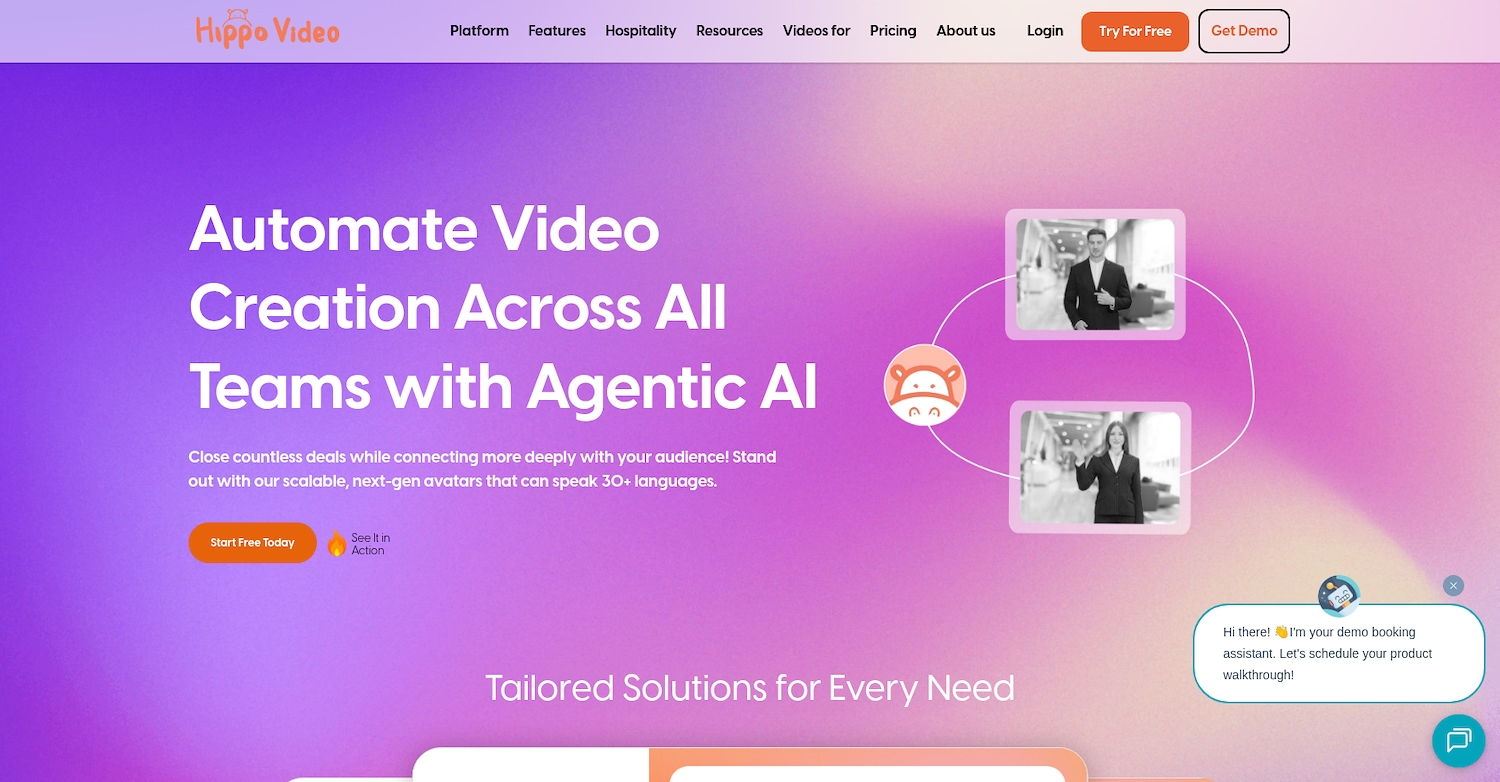
Hippo Video is a platform for personalized video creation and distribution. It allows users to record their screen and camera, then share the videos with prospects and customers. Sales and marketing teams use it for outreach, lead qualification, and customer support.
The tool aims to add a personal touch to digital communication. It serves multiple business functions with its video capabilities to help improve response rates.
Hippo Video's Main Features
- Converts text, PPTs, or PDFs into complete videos with scripts, scenes, and lifelike AI avatars.
- Creates a digital twin of a user that mirrors their voice and gestures for use in demos and support videos.
- Builds large-scale video campaigns with interactive elements like polls, quizzes, and calls-to-action.
- Offers enterprise-grade security with SOC 2 Type II, GDPR, and HIPAA compliance.
How Hippo Video Compares to Dubb
Average Review score: 4.5/5 stars based on 734 G2 reviews.
- Hippo Video converts text or documents into videos using AI avatars. This is different from Dubb, which focuses on videos recorded by the user.
- The platform allows for interactive elements like polls and quizzes inside videos, offering more ways to engage viewers than Dubb’s standard calls-to-action.
- It provides enterprise-level security with SOC 2, GDPR, and HIPAA compliance. This level of security is a specific feature not highlighted for Dubb.
- Users can create a "digital twin" that mimics their voice and gestures for automated video creation. This capability for scaling personalized video is not available in Dubb.
Hippo Video's Limitations Compared to Dubb
The video editing process in Hippo Video can feel inefficient to some users. In comparison, Dubb provides a more direct set of tools for quick trims and adjustments to sales videos.
Its wide range of features, while powerful, sometimes results in a steep learning curve. Dubb's platform centers on a more focused feature set, which some teams might find easier to adopt.
Hippo Video may present compatibility issues on certain platforms. Users report limitations with the Safari browser and the iPad app, a consideration for teams working outside a desktop or Chrome environment.
Pricing and Value Compared
Hippo Video provides a free plan and a Pro plan at $20 per month, making it a more affordable entry point. Dubb's Pro plan costs $59 per month, which is comparable to Hippo Video's Teams plan at $60 per month.
5) Covideo
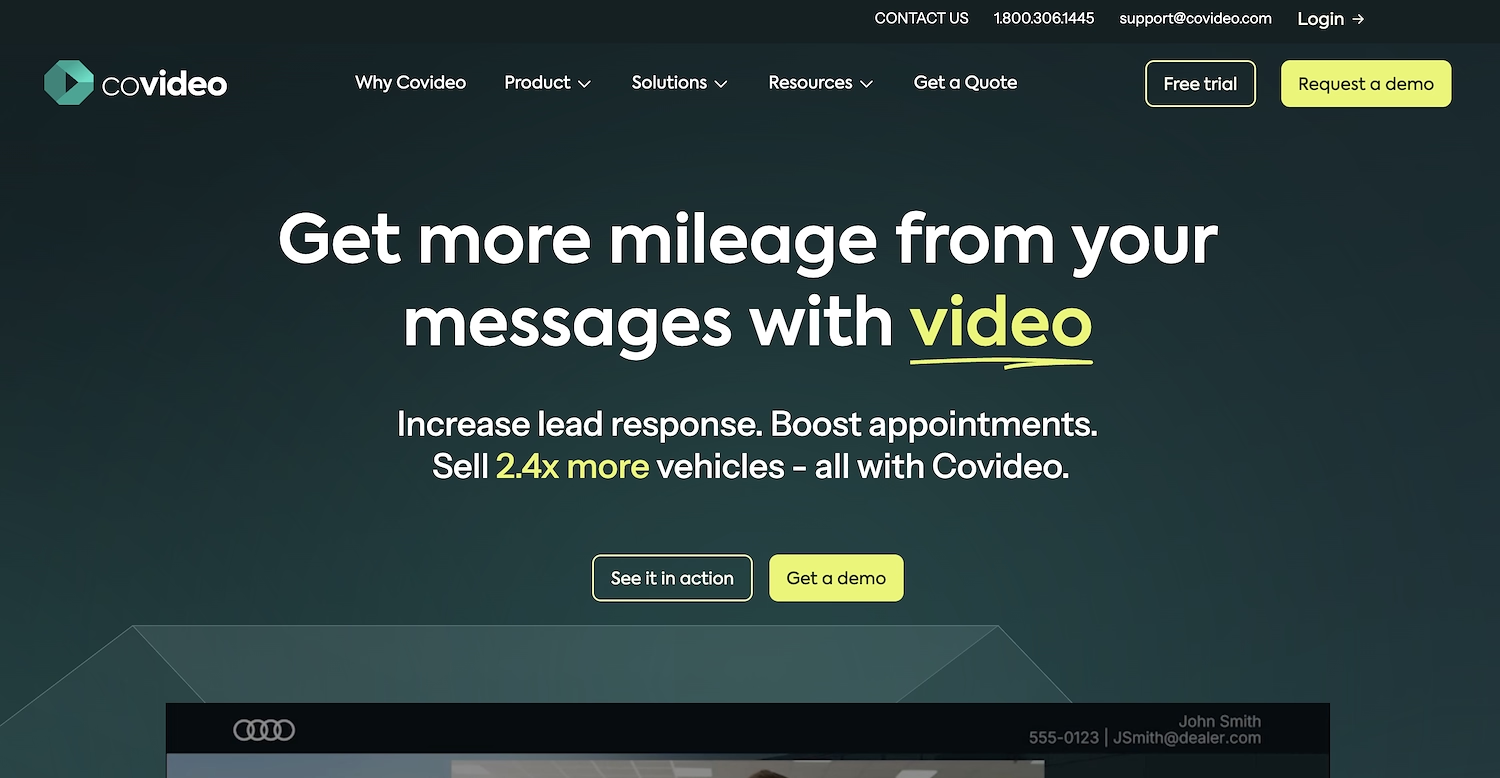
Covideo is a platform to record, send, and track video emails. It helps businesses communicate with customers and prospects. The tool includes a screen record function, video templates, and real-time notifications.
Sales, marketing, and customer service teams use it for personal outreach, virtual tours, and support instructions across the automotive, real estate, and professional services sectors.
Covideo's Main Features
- Offers tailored service workflows for technicians to record repair recommendations that managers approve before sending to customers.
- Allows customers to accept or decline repair order quotes directly from the video service page.
- Includes an audio corrector to add voice-overs to recordings made in noisy environments like service bays.
- Integrates with existing CRMs and inventory-management systems.
How Covideo Compares to Dubb
Average Review score: 4.8/5 stars based on 69 G2 reviews.
- Covideo provides specific service workflows for technicians. This allows managers to approve repair videos before they reach customers, a feature not standard in Dubb.
- It includes an option for customers to approve or deny quotes directly on the video page. This is a more direct sales function than Dubb's general call-to-action buttons.
- The tool has an audio corrector to clean up sound from noisy locations. This feature is useful for field teams, a specific use case not directly addressed by Dubb's standard editor.
- The platform integrates with inventory-management systems, which is useful for industries like automotive sales. Dubb's integrations focus more broadly on standard CRMs and marketing tools.
Covideo's Limitations Compared to Dubb
Dubb includes a built-in tool to create automated, multi-step video campaigns. Covideo lacks this feature, so users may need to integrate other software for complex sales automation.
The platform’s video editing functions are more basic. It does not provide advanced options like adding custom text overlays or virtual backgrounds, which are available in Dubb for more polished videos.
Its video landing pages offer fewer customization options. Some users note a desire for more control over branding and template design, an area where Dubb provides more flexibility.
Pricing and Value Compared
Dubb's Pro plan is $59 per month. Covideo's pricing is not publicly listed; for the most accurate information, we recommend visiting Covideo's official website.
Consider 11x for Sales Automation
For teams interested in sales automation beyond video, 11x provides digital workers for research and outreach. This can augment your sales operations with automated support. Explore how 11x can fit into your GTM strategy.
At 11x, we use AI to manage your sales playbook. Our agent Alice finds accounts, enriches data, and drives outreach. Julian qualifies prospects and schedules meetings. The platform combines data enrichment, outreach, and email warmup, replacing several tools in a traditional GTM stack.
Book a demo to see the platform in action.
6) Sendspark

Sendspark is a video platform for customer communication. Teams can record a screen or camera, then share the videos through email or a link. The tool helps businesses create personal video messages for prospects and clients at scale.
Sales and marketing departments use it for outreach and to build relationships. Support teams also use the platform to answer questions with video, which can improve ticket resolution times.
Sendspark's Main Features
- Uses AI to personalize a single video for multiple recipients by cloning the presenter's voice and inserting each prospect's name.
- Allows users to combine a new, personal introduction with a pre-recorded video for faster customization.
- Generates personalized thumbnails for emails to capture each recipient's attention.
- Lets viewers book meetings directly from the video landing page through an embedded calendar.
How Sendspark Compares to Dubb
Average Review score: 4.7/5 stars based on 370 G2 reviews.
- Sendspark uses AI to clone a presenter's voice and insert prospect names into a single video. This method for personalizing at scale differs from Dubb's focus on individually recorded messages.
- The platform allows users to request and collect videos from customers without any software installation. In comparison, Dubb's system is built for users to create and send their own videos.
- It lets users attach a new, personal introduction to a pre-recorded video, offering a different workflow for customization than Dubb's standard video editor.
- The tool generates personalized thumbnails with the recipient's name and logo. This feature is distinct from Dubb's options for customizing the entire video landing page.
- Viewers can book meetings directly from the video page through an embedded calendar. While Dubb has calls-to-action, this provides a more direct scheduling function.
Sendspark's Limitations Compared to Dubb
- Sendspark does not include a built-in tool for multi-step sales automation. Users may need to integrate other software for complex campaigns, unlike Dubb, which offers this feature natively.
- The tool provides general campaign and recipient tracking. In comparison, Dubb offers more granular analytics that track individual viewer data and push it directly into a CRM for deeper sales insights.
- Its video editing functions focus on basic adjustments. Dubb provides more advanced options, such as adding custom text overlays or virtual backgrounds, for users who need more polished videos.
Pricing and Value Compared
Sendspark offers a free plan, and its Pro plan is $15 per user per month, making it a more affordable option than Dubb's Pro plan at $59 per month. This positions Sendspark as a strong choice for teams looking for core video messaging features at a lower price point. For full details, check the pricing on Sendspark's website.
7) CloudApp
CloudApp (now Zight) is a visual communication tool for screen recordings, screenshots, and GIF creation. It helps teams share information quickly. Use cases include bug reports for developers, design feedback, and customer support answers.
CloudApp's Main Features
- Provides screen recording, screenshot capture, and annotation tools to add text, arrows, or highlights.
- Includes a GIF creator to make short, looping animations from screen recordings for quick demonstrations.
- Offers cloud-based storage and generates shareable links for all created content.
How CloudApp Compares to Dubb
Average Review score: 4.7/5 stars based on 1,269 G2 reviews.
- CloudApp excels at quick, annotated screenshots and GIFs. This serves a broader communication need than Dubb's focus on personalized sales videos.
- Its core workflow is built for speed in internal communication and support, whereas Dubb's is designed for external sales outreach.
- The platform's integrations often target productivity and development tools like Jira and Trello, differing from Dubb's sales-centric CRM connections.
CloudApp's Limitations Compared to Dubb
The platform's analytics are basic and track views. This differs from the detailed, per-contact engagement data that Dubb provides for sales teams.
CloudApp lacks customizable video landing pages with branding and calls-to-action, a function Dubb includes for lead generation.
It does not have built-in sales automation to create video campaigns. Dubb includes this function to nurture leads over time.
Pricing and Value Compared
CloudApp offers a free plan. Its Pro plan is $9.95 per month, which is significantly lower than Dubb's $59 per month Pro plan. This makes it a cost-effective tool for teams that need visual communication without advanced sales features.
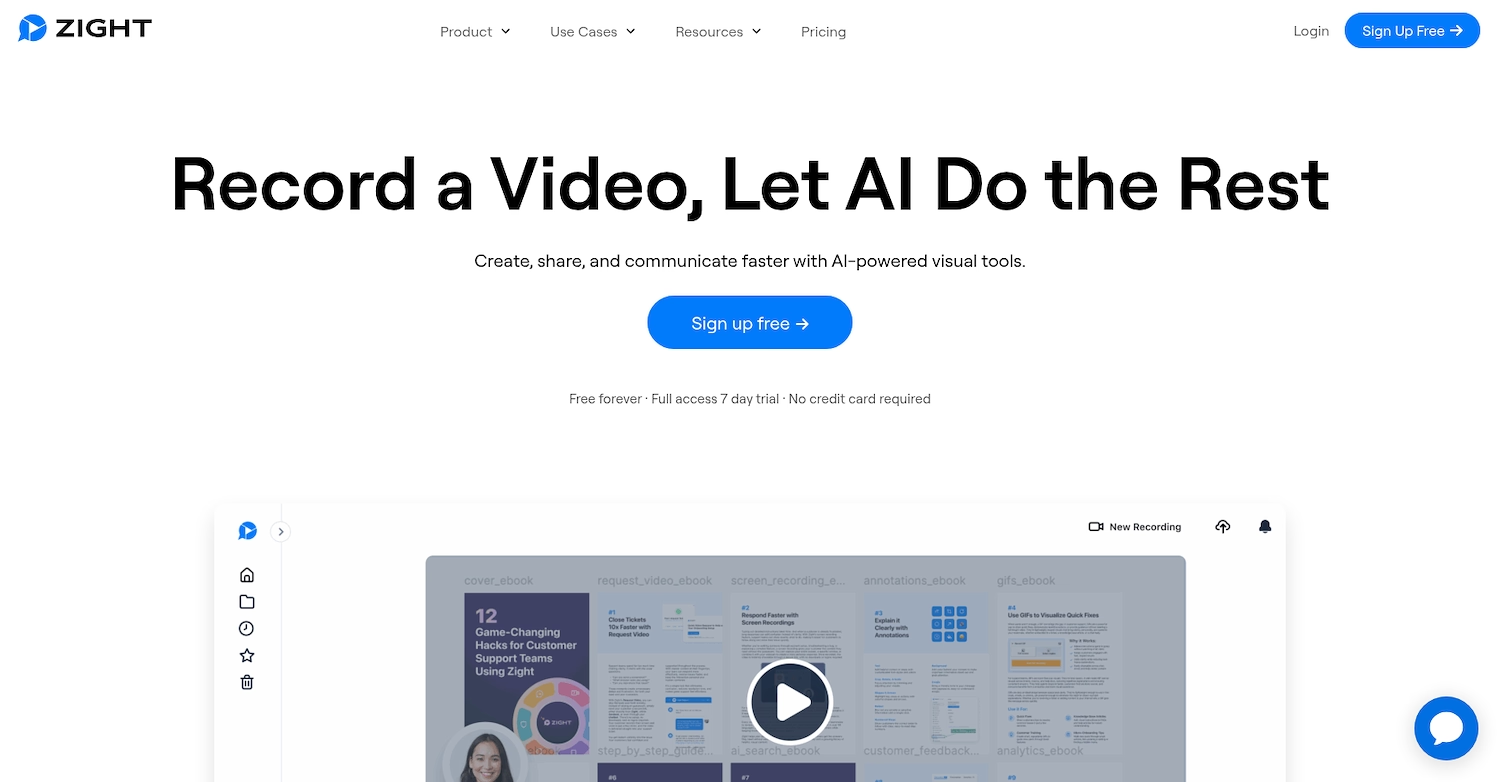
CloudApp is a tool for visual communication. It creates screen recordings, screenshots, and GIFs to help teams share information. People use it for developer bug reports, design feedback, and customer support. The platform supports fast information exchange within a company and with its customers.
CloudApp's Main Features
- Records screens, captures screenshots, and adds annotations like text, arrows, or highlights.
- Creates GIFs from screen recordings for use in short demonstrations.
- Stores all created content in the cloud and generates shareable links for distribution.
How CloudApp Compares to Dubb
Average Review score: 4.5/5 stars based on 23 G2 reviews.
- CloudApp uses AI to create deal predictions from CRM data. This differs from Dubb, which provides analytics on video viewer engagement.
- The platform includes gamification features, like team competitions, to motivate sales teams and improve CRM data quality. Dubb does not offer a similar function for team motivation.
- It applies behavioral science techniques to help refine the entire sales model. This approach is broader than Dubb's, which centers on video message engagement.
- The tool automatically captures and consolidates information from other business systems to reduce the data entry burden on sales staff. In comparison, Dubb's workflow requires sales staff to manually record and send videos.
CloudApp's Limitations Compared to Dubb
- Cloudapps Revenue Intelligence does not have native video creation or messaging tools. This is different from Dubb, whose main function is to record and send personalized sales videos.
- The platform focuses on analyzing CRM data to provide sales forecasts. In comparison, Dubb enables direct communication through video to help build relationships with individual prospects.
- It is designed to optimize the sales process using data insights. Dubb, however, is a tool for sales teams to execute outreach campaigns with personalized video content.
Pricing and Value Compared
Dubb's Pro plan is $59 per user per month. Cloudapps Revenue Intelligence offers a different model, starting at £60 per year for 50 users. This team-based pricing contrasts with Dubb's individual seat license.
8) StoryXpress
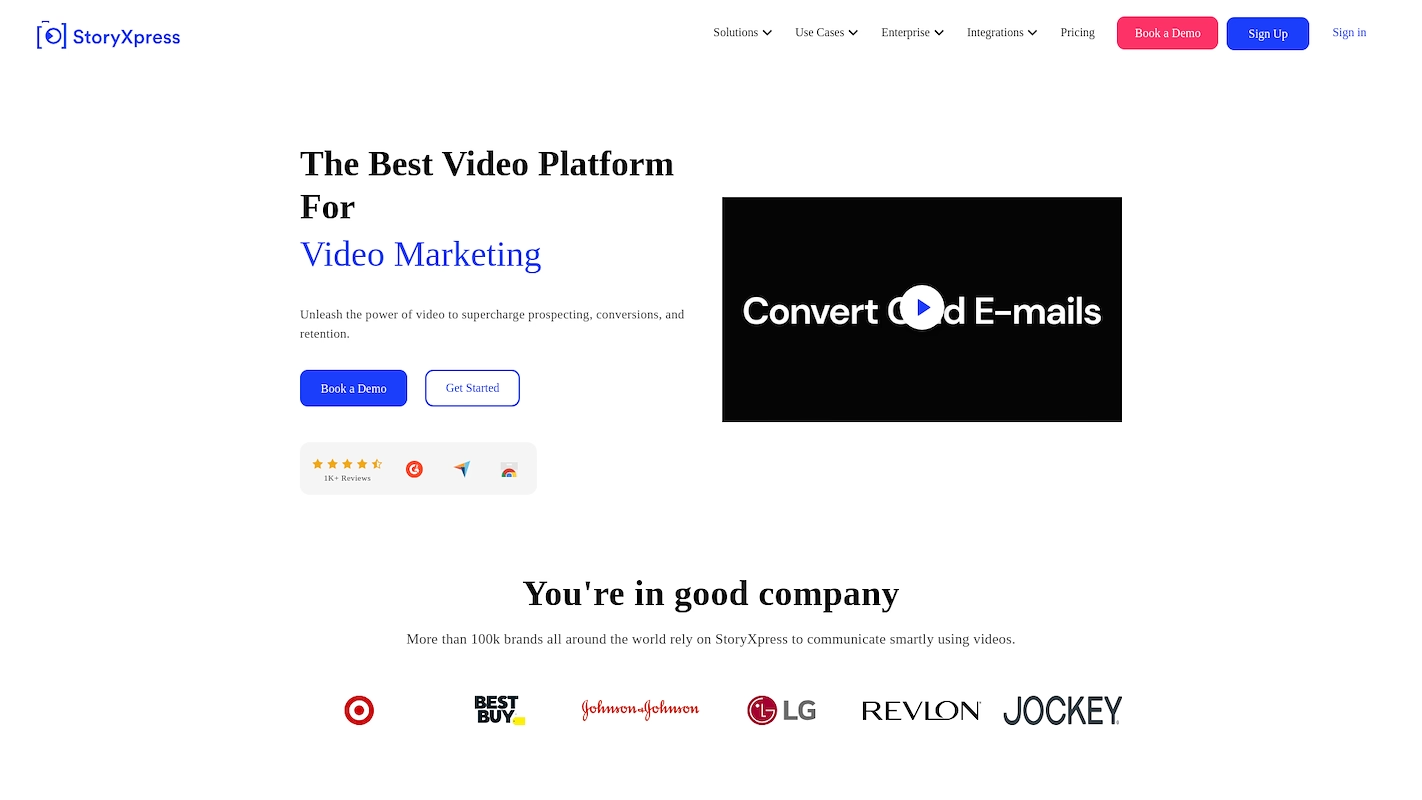
StoryXpress is a video platform for sales, marketing, and support teams. It allows users to record their screen and camera to create personalized videos for outreach, product demos, and tutorials. The platform includes a video library and analytics to track viewer engagement.
StoryXpress's Main Features
- Offers screen and video capture capabilities for creating and sharing video content.
- Includes file sharing functionality and a searchable video content management system.
- Provides viewer analytics with heatmaps, calls-to-action, and customizable video pages.
- Allows users to organize content with annotations and playlists.
How StoryXpress Compares to Dubb
Average Review score: 4.9/5 stars based on 25 G2 reviews.
- StoryXpress provides viewer analytics with heatmaps. This gives a visual map of viewer focus, a different approach to engagement data compared to Dubb.
- The tool creates animated GIF previews for emails. This feature can improve click-through rates, an option not standard in Dubb's email shares.
- It allows users to organize videos into playlists. This helps structure content for tutorials or multi-part demos, a different organization method than Dubb's video library.
- The platform offers 24/7 customer support. This level of availability is a specific benefit for global teams, unlike Dubb's standard support hours.
StoryXpress's Limitations Compared to Dubb
- StoryXpress does not have a native sales automation feature for multi-step video campaigns. In contrast, Dubb provides a built-in tool to build and run automated sequences directly on its platform.
- Some users report that the web-based video editor in StoryXpress can be slow. This is different from Dubb, which provides more responsive tools for quick edits like clip trims or text overlays.
- The platform does not offer folder-based organization for its video library. This can make content management difficult for large teams, while Dubb provides a more structured system to sort and find videos.
Pricing and Value Compared
StoryXpress offers a Lite plan at $10 per month and a Pro plan at $49 per month. Its Pro tier is more affordable than Dubb's Pro plan at $59 per month. The lower-priced Lite plan provides an accessible entry point for teams with basic needs.
9) Screencastify
Screencastify is a screen recording tool primarily used in education. It allows users to create, edit, and share videos. Teachers use it for lessons, and students use it for assignments. Businesses also use it for training and support materials.
Screencastify's Main Features
- Offers screen and webcam recording with simple annotation tools.
- Includes a video editor to trim, merge, and crop clips.
- Allows users to add interactive questions to videos to check comprehension.
- Integrates with Google Drive and Google Classroom for storage and sharing.
How Screencastify Compares to Dubb
Average Review score: 4.6/5 stars based on 421 G2 reviews.
- Screencastify is built for the education sector, with deep Google Classroom integration. This focus differs from Dubb's sales-oriented platform.
- It allows creators to add interactive questions within videos. This feature is designed for learning and assessment, not sales engagement like Dubb's CTAs.
- The platform's strength is its simplicity and ease of use. This makes it accessible for users who need basic recording without complex sales features.
Screencastify's Limitations Compared to Dubb
- The platform lacks advanced sales tools. It does not offer customizable video landing pages or built-in automation sequences, which are core features in Dubb.
- Its analytics track views and question responses. This is less detailed than Dubb's per-viewer engagement data, which is designed for sales tracking.
- Screencastify's integrations focus on educational platforms. It does not have the deep CRM integrations that Dubb provides for sales teams.
Pricing and Value Compared
Screencastify offers paid plans starting around $7 per month. This is much lower than Dubb's $59 per month Pro plan. Screencastify provides value for educators or teams needing simple video creation, while Dubb is priced for its sales-specific feature set.
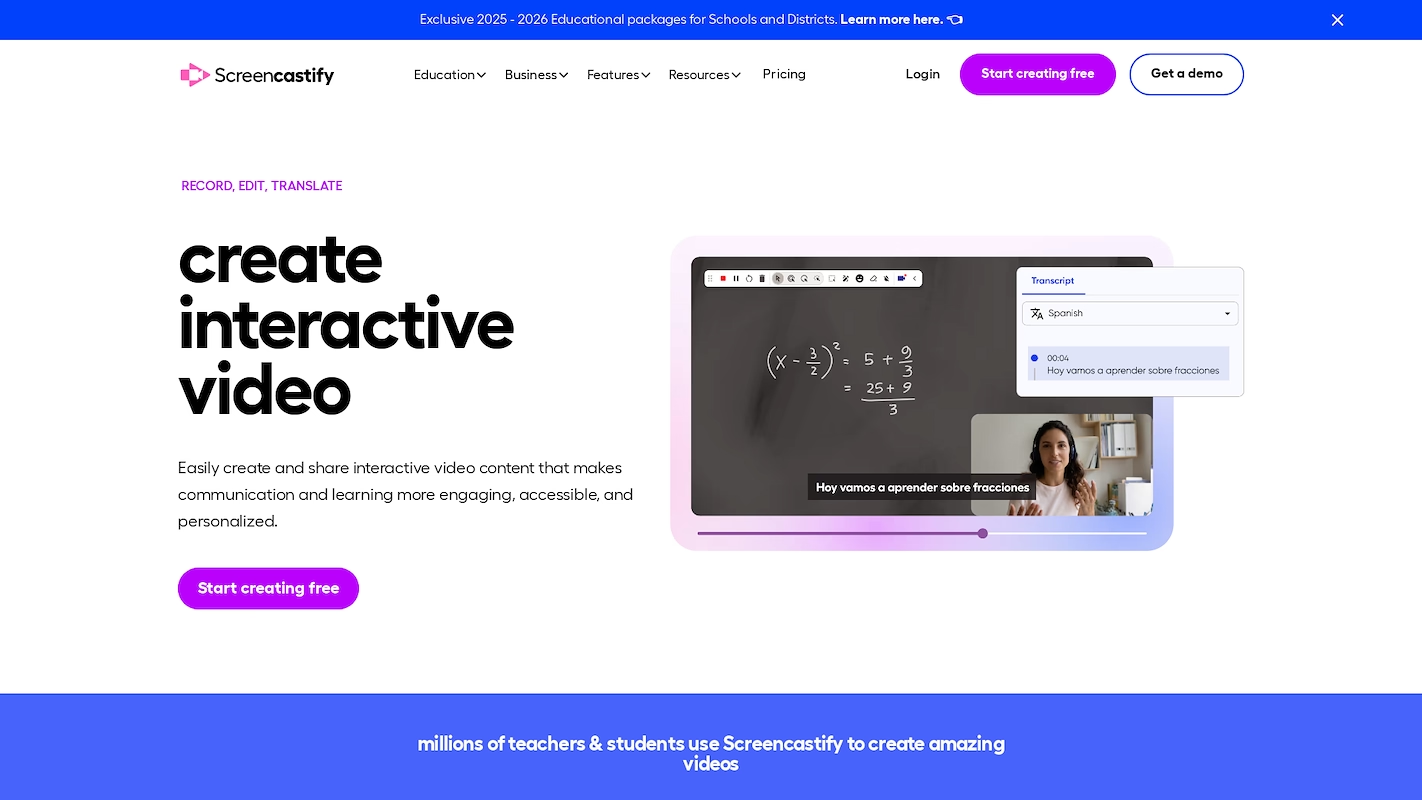
Screencastify is a screen recorder to create, edit, and share videos. It is primarily used in education, where teachers make lessons and students submit assignments. Businesses also use the tool for training and support materials.
Screencastify's Main Features
- Offers screen and video capture with an accompanying image editor for modifications.
- Includes a scrolling capture function to record content that extends beyond the visible area of a screen.
- Provides a text extraction tool to pull written content from captured images.
- Allows for file sharing of all created media through shareable links.
How Screencastify Compares To Dubb
Average Review score: 4.6/5 stars based on 70 G2 reviews.
- Screencastify includes a scrolling capture function to record content that extends beyond the visible screen, which is different from Dubb's focus on recording the visible area for sales videos.
- The tool offers a text extraction feature to pull written content from images, providing a data capture utility not found in Dubb's video-centric platform.
- It provides an image editor for annotating screenshots, a feature geared toward support and training materials rather than the sales-focused video editing in Dubb.
- The platform automatically saves recordings to Google Drive, offering a specific workflow for teams in the Google ecosystem, whereas Dubb uses its own cloud storage.
Screencastify's Limitations Compared To Dubb
- Screencastify offers basic video editing functions. For more polished sales videos, some users may find Dubb's editor more capable, as it allows for custom text overlays and virtual backgrounds.
- The tool is not primarily built for sales engagement. This is different from Dubb, which includes features like customizable calls-to-action to prompt a viewer to book a meeting or visit a website.
- Some users report that it can be difficult to save videos for offline use. Dubb, in contrast, provides more direct options to manage and download video files from its own platform.
Pricing and Value Compared
Dubb's Pro plan is $59 per user per month. Screencastify's pricing is not publicly available; for the most accurate information, we recommend visiting Screencastify's official website.
10) OneMob
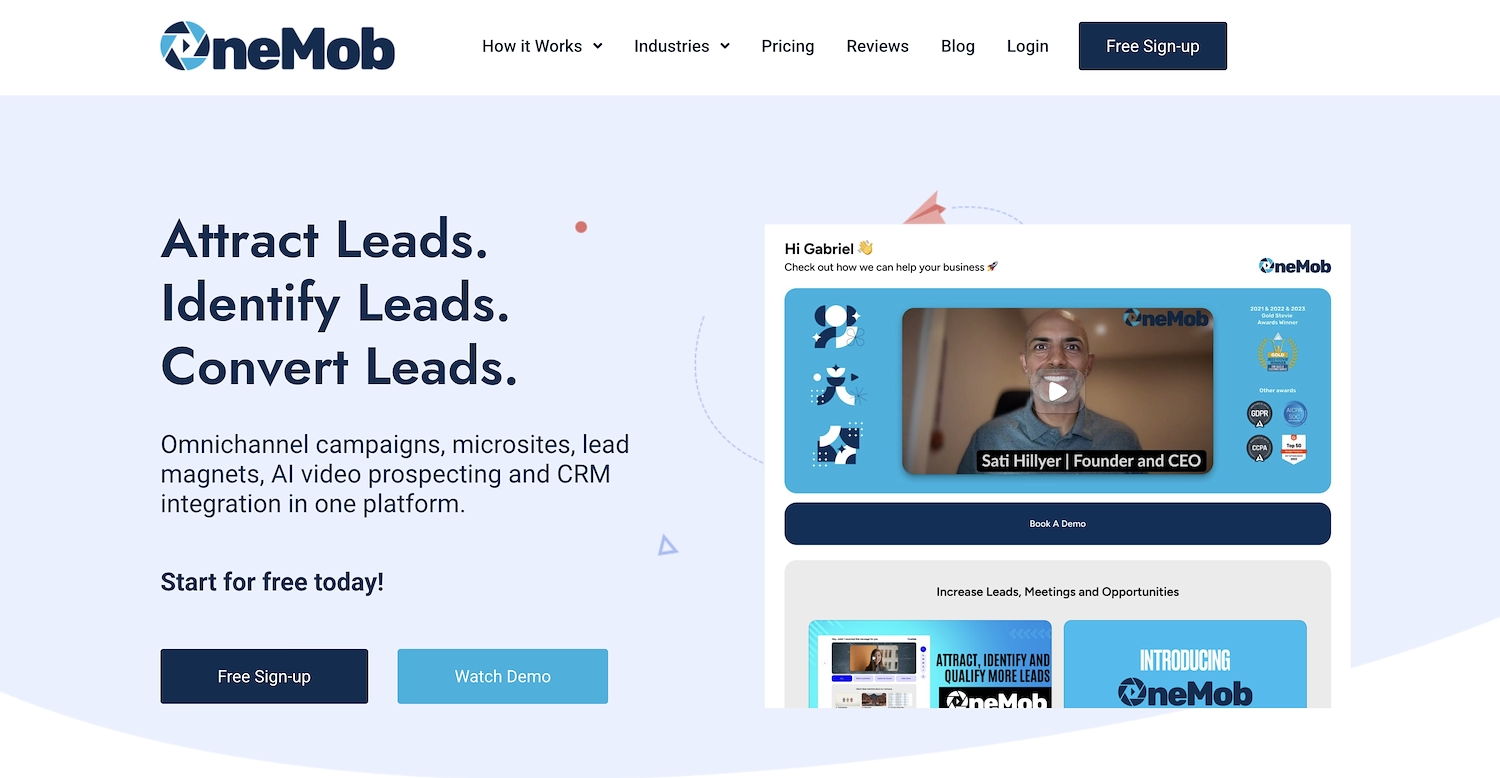
OneMob is a video engagement platform for sales and marketing teams. Users record their screen and camera to create personalized videos for outreach, training, and customer engagement. The platform shares these videos via email or a link and provides analytics to track performance.
OneMob's Main Features
- Offers a microsite builder with templates and tagging options to create custom content pages.
- Includes a script teleprompter for recording and a video approval workflow for team management.
- Provides native plugins for email clients and sales tools, including Gmail, Outlook, and Salesforce.
- Integrates with content platforms like Zoom, Google Drive, Box, and Dropbox for content management.
How OneMob Compares to Dubb
Average Review score: 4.9/5 stars based on 143 G2 reviews.
- OneMob includes a microsite builder to create custom content pages with various templates. This differs from Dubb, which centers on single video landing pages.
- The platform provides a built-in script teleprompter to help users record more polished videos. This tool for guided recording is not a standard feature in Dubb.
- It offers a video approval workflow for team management. This allows managers to review content before it is sent, a feature suited for larger teams that is different from Dubb's individual-focused workflow.
- The tool integrates with content platforms like Zoom and Google Drive. This allows for easier content management from various sources, while Dubb's integrations focus more on CRM systems.
OneMob's Limitations Compared to Dubb
- OneMob lacks a native sales automation tool to create multi-step video campaigns. In comparison, Dubb provides this feature built-in, which allows users to build automated sequences directly on the platform.
- The platform's video editing functions are more basic. For users who need polished videos with custom text or virtual backgrounds, Dubb offers more advanced options within its editor.
- Some users report that its analytics can sometimes show inflated open rates. Dubb, in contrast, provides more granular, per-contact engagement data that integrates directly into a CRM for sales tracking.
Pricing and Value Compared
OneMob offers a free plan, a Pro plan at $25 per user per month, and an Enterprise plan starting at $50 per user per month. This makes its paid tiers more affordable than Dubb's Pro plan, which costs $59 per month. For teams that prioritize microsite creation and core video features over native sales automation, OneMob presents a more cost-effective choice.
Which One Should You Go With?
Choosing the right Dubb alternative depends on your team's specific needs, from sales automation to internal communication. This guide has outlined several options to help you evaluate which platform best fits your workflow and business goals.
If your needs extend beyond video messaging to sales automation, consider 11x. The platform provides digital workers for tasks like prospect research, outreach, and lead qualification, potentially replacing several tools in your GTM stack.




